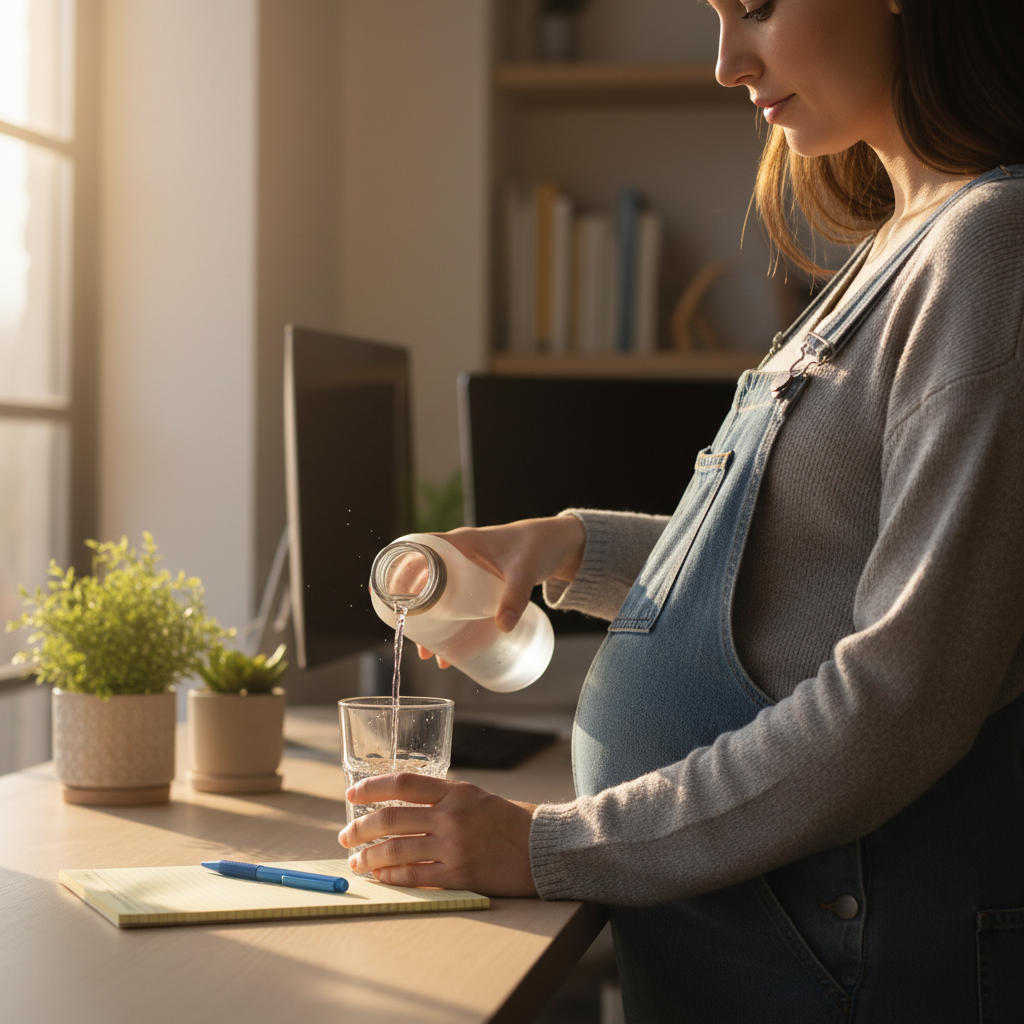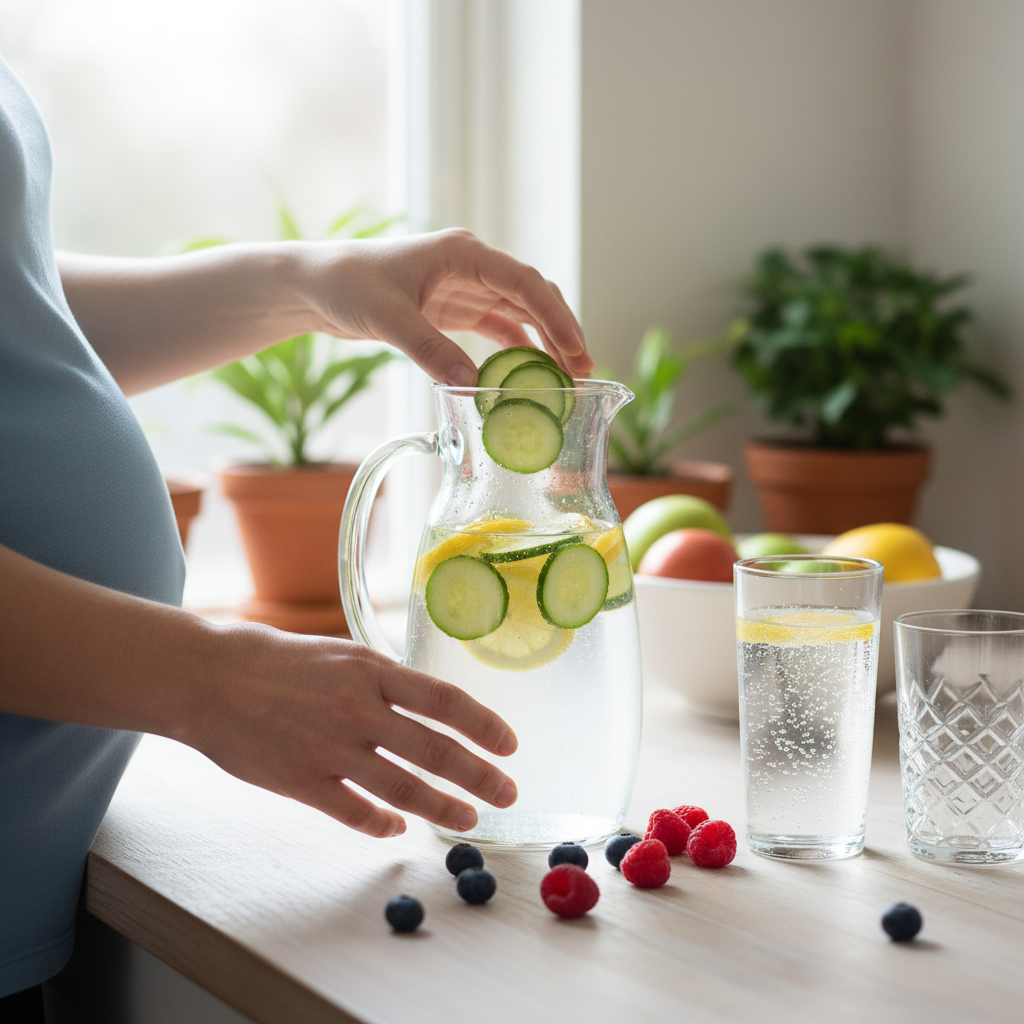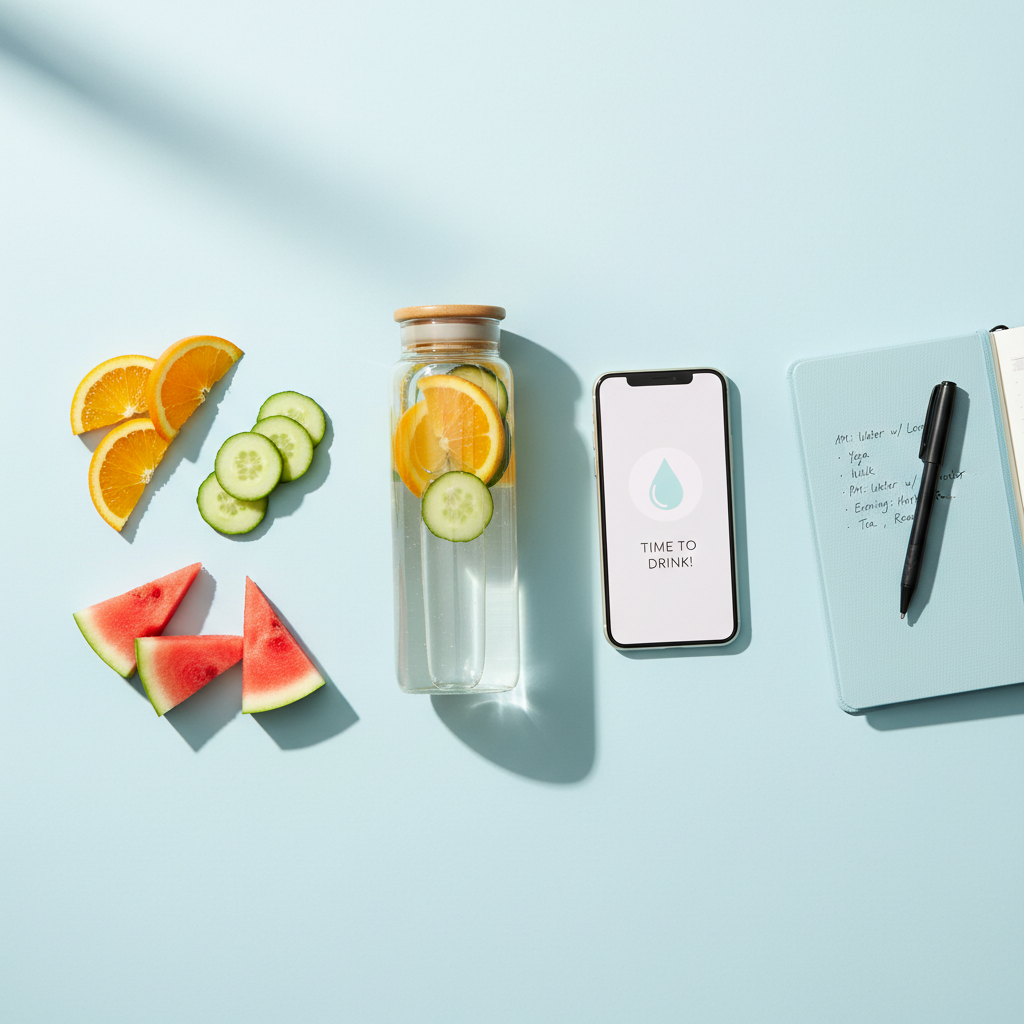
Staying Hydrated During Pregnancy: Essential Tips for Mom and Baby
Proper hydration during pregnancy plays a vital role in supporting both your health and your baby’s development. As your body works to nurture new life, maintaining adequate fluid intake becomes even more important than usual, helping to form amniotic fluid, build new tissue, and transport essential nutrients.
Key Highlights
Here’s what you need to know about staying hydrated during pregnancy:
- Aim for 8-12 cups (64-96 ounces) of fluid daily during pregnancy
- Pale yellow urine indicates good hydration levels
- Proper hydration helps prevent common pregnancy discomforts like headaches and constipation
- Water-rich foods like fruits and vegetables contribute to your daily fluid intake
- Creating hydration habits helps ensure consistent fluid intake throughout your pregnancy
Understanding Your Hydration Needs During the Second Trimester

The second trimester brings significant changes to your body’s fluid requirements. During weeks 13-27, your blood volume increases by about 50%, requiring more fluids to support this expansion. According to the American College of Obstetricians and Gynecologists, pregnant women should drink 8-12 cups (64-96 ounces) of water daily, with needs often increasing during the middle months of pregnancy. This increased fluid requirement helps support your growing baby and the changes happening in your body.
Monitoring your hydration status becomes particularly important as your pregnancy progresses. Clear or pale yellow urine generally indicates proper hydration, while dark yellow urine suggests you need to drink more. Many women find that carrying a reusable water bottle helps them track their intake throughout the day. Remember that your fluid needs may vary based on factors like activity level, weather, and your specific health conditions, so it’s always best to discuss your individual requirements with your healthcare provider.
Recognizing Hydration’s Role in Pregnancy Symptoms
Dehydration can worsen many common pregnancy discomforts, including fatigue, constipation, and urinary tract infections. Many women experience pregnancy headaches second trimester that can be triggered or worsened by inadequate fluid intake. The American Pregnancy Association notes that staying well-hydrated can help reduce the frequency and severity of these headaches by maintaining proper blood volume and flow.
Proper hydration also supports your body’s ability to regulate temperature, which becomes especially important as your metabolic rate increases during pregnancy. Your body uses water to produce sweat, helping you cool down when overheated. This temperature regulation is particularly crucial during physical activity or in warm weather. If you notice increased thirst, dry mouth, or feeling lightheaded, these may be early signs that you need to increase your fluid intake promptly.
How Hydration Supports Your Baby’s Development

Water plays a crucial role in your baby’s environment and development throughout pregnancy. During the 2nd month pregnancy and beyond, adequate hydration helps form the amniotic fluid that surrounds and protects your growing baby. This protective fluid cushions your baby, allows for movement, helps maintain a consistent temperature, and supports proper lung and digestive system development.
Beyond amniotic fluid production, staying hydrated helps your body efficiently deliver nutrients to your baby through the placenta. The placenta requires adequate blood flow to function optimally, and proper hydration supports healthy circulation. As noted by the Mayo Clinic, good hydration also helps your body absorb essential nutrients from food and prenatal vitamins, making them more available to support your baby’s growth and development. This nutrient delivery system becomes increasingly important as your baby experiences rapid development during the second trimester.
Benefits for Maternal Health and Comfort
Proper hydration offers numerous benefits for your comfort and health during the 2nd trimester. Drinking enough water helps prevent constipation, a common pregnancy complaint that affects many women due to hormonal changes and pressure from the growing uterus. Adequate fluid intake softens stool and supports regular bowel movements, reducing discomfort and strain.
Water also plays a key role in reducing swelling in your feet, ankles, and hands—a condition called edema that commonly occurs during pregnancy. While some swelling is normal, staying well-hydrated helps your body flush excess sodium and waste products, potentially reducing uncomfortable swelling. Good hydration supports kidney function, helping your body process waste more efficiently at a time when your kidneys are working harder than usual. This increased efficiency can reduce your risk of urinary tract infections and kidney stones, both more common during pregnancy.
Making Hydration Enjoyable and Accessible

If plain water becomes unappealing during your 2ns trimester, try infusing it with natural flavors to make hydration more enjoyable. Adding slices of cucumber, lemon, lime, berries, or mint leaves can transform ordinary water into a refreshing treat without added sugars or artificial ingredients. Sparkling water is another alternative that can help satisfy cravings for carbonated beverages while providing the hydration you need.
Herbal teas can also contribute to your daily fluid intake, providing variety and potential benefits. Caffeine-free options like ginger, peppermint, or red raspberry leaf tea (after consulting with your healthcare provider) can offer both hydration and comfort for pregnancy symptoms. For those struggling with morning sickness, small sips of water throughout the day or sucking on ice chips may be more manageable than drinking full glasses at once. Remember that while herbal teas can contribute to hydration, it’s important to research each type and discuss them with your healthcare provider, as not all herbs are safe during pregnancy.
Creating Sustainable Hydration Habits
Establishing consistent hydration routines can help ensure you meet your fluid needs throughout your 2nd trimester. Start your morning with a glass of water before anything else, setting a positive tone for the day’s hydration. Keep a reusable water bottle with you at all times—at work, in the car, and beside your bed—to make drinking water convenient and automatic.
Technology can support your hydration goals through apps that track your water intake and send reminders throughout the day. Setting specific hydration goals tied to your daily routine can also help—for example, finishing one water bottle before lunch and another before dinner. Many women find that drinking a glass of water before and after each meal or snack helps them meet their daily requirements without feeling overwhelmed. Creating these habits now will not only support your pregnancy but establish healthy patterns that can continue after your baby arrives.
Balancing Your Hydration Approach
While increasing your water intake is important, balance is key to comfortable hydration during pregnancy. Drinking too much fluid right before bed may increase nighttime bathroom trips, disrupting your already-challenged sleep. Instead, focus on consistent hydration throughout the day, tapering off in the evening hours. This approach helps you stay hydrated while minimizing sleep disruptions.
It’s also important to understand which beverages to limit during pregnancy. Caffeine-containing drinks like coffee, tea, and some sodas should be consumed in moderation, as caffeine is a mild diuretic and can potentially affect your baby’s heart rate and sleep patterns. The American College of Obstetricians and Gynecologists recommends limiting caffeine to less than 200mg daily (about one 12-ounce cup of coffee). Similarly, sugary drinks like sodas and fruit juices should be limited, as they can contribute to excessive weight gain and blood sugar fluctuations without providing optimal hydration benefits.
Conclusion
Staying well-hydrated during pregnancy is one of the simplest yet most powerful ways to support your health and your baby’s development. By making hydration a priority and creating sustainable habits, you’re providing essential support for your changing body and your growing baby. Remember that your hydration needs are unique to you and your pregnancy, so work with your healthcare provider to determine the approach that works best for your situation.
